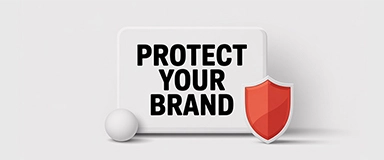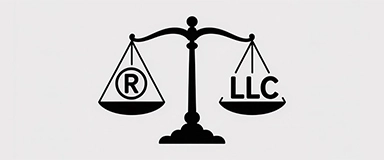If you want to make your podcast into a true brand, learning how to trademark a podcast name can give you country-wide and international recognition and protection.
How Franchising Affects Trademark Protection
Written by Emily Brooks ·

So, you've built a successful business with a recognizable brand that customers trust. But you're not yet ready to truly go international. That's where franchising comes in – letting others use your trademark and business model to expand your reach while generating royalty income.
On paper, it's a win-win. However, the moment you hand over your trademark to franchisees, you're entering a minefield of legal complications. If you don't know the rules of the game, your biggest asset can become your worst liability.
What Franchising Really Does to Your Trademark
When you franchise your business, you're not just licensing your business model. You're putting your trademark in the hands of people you can't directly control. This creates a fundamental tension in trademark protection law that trips up even experienced business owners.
Here's the gist: trademark law requires you to maintain control over how your mark is used to keep your trademark protected. But franchising, by definition, means letting other people use your trademark in their own businesses.
This creates a unique set of challenges, as your trademark stays protected only if you maintain sufficient control over how franchisees use it. Too little control and the law might decide you've abandoned your rights. Too much control and you might accidentally turn your "independent" franchisees into employees, opening a whole new can of legal worms.
The Real Risks You're Facing
Much like any business venture, trying to franchise your company comes with risk.
Quality Control Is Your Responsibility (But Not Up to You)
If you don't maintain adequate quality control over your franchisees, trademark law considers this "naked licensing," which can invalidate your trademark entirely.
What does adequate control actually mean? You need written standards covering everything from product quality to customer service, regular inspections to ensure compliance, and swift action when franchisees go off-brand. Miss any of these, and you're gambling with your most valuable business asset.
For example, franchisees might start cutting corners on ingredients or suppliers to boost profits. Customers get sick, blame your brand, and suddenly your trademark is associated with poor quality. Without proper quality controls in your franchise agreement, you have limited recourse.
Rogue Franchisees Can Tank Your Brand
Here's where franchising gets dangerous. Unlike employees, franchisees are independent business owners with their own financial pressures and decision-making authority. But unlike a traditional independent business, what they do is ultimately a reflection of your brand. So when they make bad choices, your trademark suffers the consequences.
Common scenarios include:
- Franchisees using substandard materials while displaying your trademark
- Poor customer service that damages your brand reputation
- Franchisees going bankrupt and selling knockoff products under your name
- Unauthorized menu changes or service modifications
- Marketing campaigns that contradict your brand messaging
Each of these situations can weaken your trademark protection and give competitors ammunition to challenge your rights.
Geographic Nightmares
Franchising is typically done to expand in new territories, including international markets where trademark protection works differently. What applies to your brand in one country might be completely irrelevant in another:
- Your trademark might already be registered by someone else in the target markets.
- Local franchisees might be able to register your trademark in their own names.
- Cultural differences can make your brand name offensive or meaningless.
- Enforcement becomes exponentially more expensive across borders.
How Franchise Agreements Make or Break Trademark Protection
Your franchise agreement is a trademark protection strategy in legal form. Get the language wrong, and you're setting yourself up for expensive disasters down the road.
Typical non-negotiables include:
- Trademark Ownership Clause: Make it crystal clear that you own the trademark, not the franchisee. This sounds obvious, but sloppy language here can cost owners their brands.
- Quality Standards: Detailed specifications for everything that affects brand perception. This means product quality, service standards, store appearance, employee training, or anything else customers can expect or experience with your branding.
- Inspection Rights: You need the legal right to inspect franchisee operations, with specific consequences for non-compliance. "Best effort" won't cut it when you're defending your trademark in court.
- Termination and Transition: What happens to signage, inventory, and customer relationships when the franchise relationship ends? Unclear transition terms create opportunities for former franchisees to compete using your brand recognition.
The International Complications
Expanding internationally through franchising creates unique trademark protection challenges that domestic-only businesses never face.
Registration Strategy
You'll need to decide whether to register trademarks yourself in each country or rely on local franchisees to handle registration. Each approach has risks - direct registration is expensive but gives you control, while franchisee registration is cheaper but can result in not maintaining local ownership of your brand.
Cultural Adaptation
Your trademark might need modification for local markets, but changes can weaken your overall brand protection. How do you maintain consistency while adapting to local preferences and legal requirements?
Enforcement Across Borders
When someone infringes your trademark in a foreign market, you need to determine who handles enforcement. Will this be you or the franchisee that's responsible for that region? If you don't pick correctly or falter with your response, you'll only end up with more damage to your brand.
What Happens When Things Go Wrong
When franchisees fail, they often try to squeeze every last dollar from your brand before going under. This might mean cutting quality, defaulting on royalties, or even selling their business to competitors who want access to your customer base.
Without iron-clad franchise agreements and proactive monitoring, you'll find yourself fighting legal battles while trying to limit damage to your trademark. Former franchisees might continue operating with similar names, confusing customers and diluting your brand even further.
In the same vein, competitors love attacking franchise trademarks because the multiple users and varied quality control create vulnerabilities. They'll argue that inconsistent use by franchisees shows you've lost control of your mark, or that variations in implementation prove the trademark has become generic.
These challenges are expensive to defend and can drag on for years, during which your trademark protection remains uncertain.
Protecting Your Trademark in the Franchise Game
Your franchise agreement is your first and best defense. Work with attorneys who specialize in both franchise law and trademark protection, as that's where most problems develop.
Key elements that actually matter:
- Specific quality standards, not general guidelines
- Regular inspection schedules with real consequences
- Proper and consistent advertising across franchises
- Clear procedures for handling trademark violations
- Termination clauses that protect your brand during transitions
- International registration and enforcement responsibilities
Next, set up systems to monitor franchisee compliance before problems become brand disasters. This could mean regular site visits, mystery shopping programs, customer feedback monitoring, and swift action when standards slip. While implementing all this (on an international level, no less) might seem pricey, the cost of monitoring will always be lower than the cost of rebuilding a damaged brand.
If you're thinking about international franchising (as that's the most natural option), plan your trademark strategy before you sign any agreements. Register your trademarks in target countries yourself, research local laws and cultural considerations, and build enforcement protocols into your international franchise agreements.
Ultimately, successful franchise trademark protection comes down to consistent enforcement of clear standards. This means creating detailed operations manuals, training franchisees thoroughly, conducting regular audits, and taking swift action when problems arise.
Remember: every exception you make becomes a precedent that weakens your position in future disputes.


